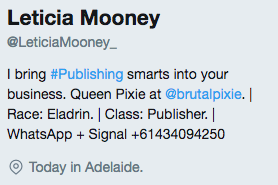What is the bullshit with career titles?
I ask this question, as bluntly as I possibly can, for good reason. The industry that I work in is filled with conflicting messages. None of it makes sense to the outside world. None of it makes sense to the inside world. Therefore, it must be bullshit.
My company has moved from content strategy to content writing, and then to distribution. I’ve watched copywriters become content writers. I have watched content strategists argue until they’re blue in the face about what defines content strategy. Hell, I even weighed in on that one!
Now, we are seeing documentarians (technical writers, for you old-school folk out there) describing themselves as content designers. The User Experience crew are considering themselves content designers. Marketers decided that they are content strategists and content marketers, and pretty soon they will be content designers too.
Watching this madness swirl out there in the atmosphere, I have decided to take a step backwards. I don’t care for career titles. Unless you’re in a profession that actually is a profession, your title means nine-tenths of nothing. Chances are, the final tenth is something that you understand differently from your boss, that your team understands differently from you, and that your family refuses to understand. I say refuse to understand, because you keep trying to explain it, and not one little bit of it sinks in.
The entire career title idea, in my industry anyway, got shattered when the internet became ubiquitous and omniscient. We had all of these people who were dissatisfied with tech teams’ lack of attention to users suddenly stand up and say, hey hang on this isn’t right. So we had the first content strategists. As the ideas of the first writers and thinkers grabbed hold, they started to multiply – like a fertilised cell.
This cell, which was first content strategy, became a whole lot of cells really quickly. We suddenly had people serious about the end-user experience, and the UX community started to proliferate. We suddenly had writers understand that they were valuable in the tech space, for the purposes of improving end-user experience. Therefore the digital writer, or strategic writer, or (call them whatever you like) started to proliferate in new ways. We suddenly had marketers understand that digital required content visibility, so content marketing began to proliferate.
And now we’re at the place in this very young, burgeoning profession where it’s all about ‘design’. Design thinking is sexy, didn’t you know? Everyone has moved away from strategy and headfirst into design.
So what’s my problem? Well, none of it helps the end users – who are the people buying the skills.
Career titles are only valuable when you have a definite, important, understandable concept. Right now, none of this work is understood except by the people inside those roles, and working with people in those roles. The rest of the world is still light-years behind it. It won’t be until there is some kind of regulation or assessment, and a collective of influential people decide on a title, that a known title will take hold. And that, my friends is a long way in the future.
You might be wondering what I call myself.
Today, I decided that I’m a publisher. A publisher requires user smarts; business smarts; strategic smarts. A publisher requires an understanding of the roles of content, message, editorial, and business oversight. A publisher needs to understand business models, innovation, diversification. A publisher needs to have a grasp on distribution and visibility. A publisher needs to have PR smarts, people skills, the ability to create from nothing something of impact. I spend my days advising businesses and individuals on how to write, publish, monetise, promote, align with business objectives.
That is what I do. It feels right. I feel certain about it. So certain that I updated my professional Twitter account (yep, I separated my business self from my regular self):
And if you’re a long-time reader, you’ll know that this feeling of certainty is something I’ve been missing since about 2008. It is an absolute revelation.

God, don’t get me started. Pretty sure this goes well deep in all industries that have anything with “technology” in it. So it includes yours, mine and almost all of them. People just like to a) have powerful (in their mind) titles, or b) unique titles, that’s all. So when I’m saying “I’m a software developer” it’s saying way more about myself, albeit without specifics, than “Senior Software engineer in Big Data”, which doesn’t mean much.
I think it is true in technology-related industries. I wonder whether it really does come back down to, “nobody generically understands this stuff”. It’s not “lawyer”, or “doctor” or “accountant”. It’s so niche, and such hidden work, that finding the nexus of meaning is difficult. Even if it is powerful or unique, if it doesn’t create meaning for other people, then it can become a liability rather than an asset, don’t you think?